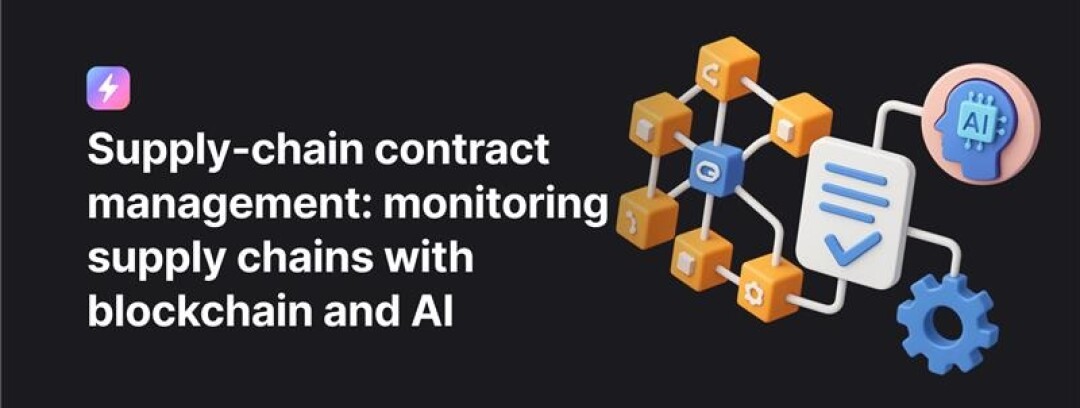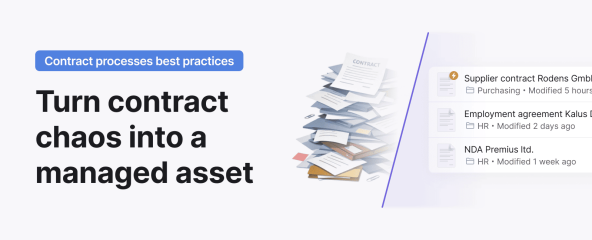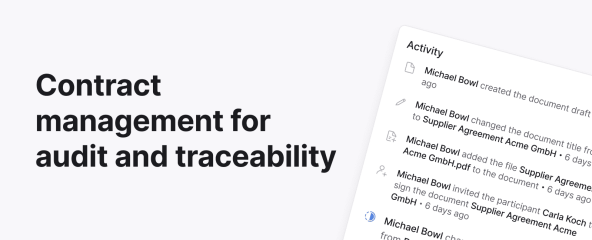
The German Supply Chain Act (Lieferkettengesetz) and the European CSDDD present companies with new challenges in transparency, sustainability, and compliance. Already in 2021, Elena Mechik (CEO of Inhubber) and Kai Baumann demonstrated in an analysis how blockchain and artificial intelligence can make contract management in global supply chains more secure and efficient.
Today, these concepts are practically implemented with Inhubber: AI-powered contract analysis, tamper-proof blockchain archiving, and automated workflows help companies meet regulatory requirements, minimize risks, and future-proof their supply chains.
Analysis by Elena Mechik and Kai Baumann (2021) – more relevant than ever today
The debate about supply chains, sustainability, and digital transformation has been ongoing for years. Back in November 2021, Elena Mechik and Kai Baumann published an analysis on how blockchain and artificial intelligence (AI) could revolutionize contract management in the supply chain sector. At that time, the German Supply Chain Act (LkSG) had just been passed, the pandemic acted as a catalyst for digital processes – and many companies were facing, for the first time, the question of how compliance, transparency, and security in global supply chains could be technically implemented.
Four years later, it is clear: their insights were pioneering. Today, with Inhubber, companies have a practical CLM platform at their disposal that realizes the central ideas of this research.
Digital lessons from the pandemic
The COVID-19 pandemic forced companies worldwide to radically digitalize their processes. Over 55% of medium-sized companies in Germany set up new home office workplaces. Digital communication became standard, and automation rose sharply (IDG Research Services study).
Procurement in particular revealed a tension:
- Paper-based contract processes were too slow and resource-intensive.
- Pure cloud solutions without secure encryption increased the risk of industrial espionage and manipulation.
It became clear: a new generation of contract management was needed – tamper-proof, transparent, and automatable.
Blockchain: trust through immutability
At its core, blockchain addresses the greatest challenge of global supply chains: lack of trust.
- Data integrity: Every relevant change is cryptographically secured. Manipulation is practically impossible.
- Transparency: All stakeholders can track who processed which data and when.
- Control: Data owners retain sovereignty over their information.
This is essential for compliance with the Supply Chain Act: companies must be able to prove that human rights and environmental standards are upheld – not only by direct suppliers, but throughout the entire value chain.
Artificial intelligence: understanding contracts and detecting risks
In parallel, AI is unfolding its potential in contract analysis:
- Detection of relevant clauses (e.g. liability, termination rights, ESG obligations).
- Automatic risk assessment of supplier contracts.
- Fast reporting to supervisory authorities such as BAFA.
Already in 2021, two-thirds of German companies were using ML methods (IDG Research Services). Today, with generative AI, the efficiency gains are even greater: contract volumes that previously took weeks to analyze manually are processed within hours.
Supply Chain Act, EU-CSDDD and ESG
The German Supply Chain Act (LkSG) was an important first milestone. Since then, the EU has adopted the Corporate Sustainability Due Diligence Directive (CSDDD), which sets even broader requirements. Companies must not only analyze risks, but also actively implement and document preventive measures (EU Commission).
Here, the strength of combining blockchain + AI becomes clear:
- Blockchain provides immutable evidence.
- AI generates risk analyses, identifies gaps, and recommends adjustments.
From research to practice: Inhubber as an enabler
The concepts developed in the analysis by Mechik and Baumann are now reality. As a Contract Lifecycle Management (CLM) platform, Inhubber provides:
- Blockchain-based eSignature and tamper-proof archiving (Electronic seal – the digital signature for companies).
- AI-driven contract analysis for compliance, ESG, and Supply Chain Act requirements.
- Automated workflows for risk analysis, audit preparation, and reporting.
- Multi-tenancy for the secure separation of supplier data.
Thus, past research has become practical innovation: companies can manage their supply chains transparently, efficiently, and sustainably – while also meeting regulatory requirements.
Sustainable contract management of the future
Already in 2021, the authors predicted that tokenized contracts would become the standard. This vision is now tangible: contracts are digital, dynamic, and fully traceable – a prerequisite for Industry 4.0.
The benefits go far beyond compliance:
- Resilience: Companies react more quickly to crises.
- Sustainability: ESG criteria become measurable and verifiable.
- Competitive advantage: Companies that digitalize their supply chains also optimize accounting, production, and sales.
Supply chains are the lifelines of the global economy – and at the same time its greatest vulnerabilities. They hold enormous value but also significant risks: counterfeiting, fraud, human rights violations, or compliance breaches. With the Supply Chain Act and the EU-CSDDD, legislators demand not only transparency but verifiable evidence of responsible action.
Inhubber addresses this challenge by uniting blockchain and AI in a single platform: blockchain ensures immutability and verifiability, AI provides intelligent analysis of obligations, ESG clauses, and risks. The result: audits become faster, risks more predictable, and sustainability measurable.
The benefits are cross-industry: pharmaceutical companies can document every delivery in detail, defense contracts can be tracked without gaps, manufacturers can secure ESG standards across their entire supply chain. In all cases, data is not only stored but indisputably proven.
Given growing regulatory, technological, and geopolitical requirements, the resilience of companies will increasingly depend on whether their digital infrastructures are based on verifiable trust. More on the topic of compliance.
With its roots in research, Inhubber demonstrates how blockchain and AI can transform the complexity of supply chains into an opportunity: for transparency, security, and sustainable growth.





